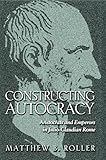Constructing Autocracy : Aristocrats and Emperors in Julio-Claudian Rome / Matthew B. Roller.
Material type: TextPublisher: Princeton, NJ : Princeton University Press, [2001]Copyright date: ©2001Description: 1 online resourceContent type:
TextPublisher: Princeton, NJ : Princeton University Press, [2001]Copyright date: ©2001Description: 1 online resourceContent type: - 9780691050218
- 9781400824090
- online - DeGruyter
- Issued also in print.
| Item type | Current library | Call number | URL | Status | Notes | Barcode | |
|---|---|---|---|---|---|---|---|
 eBook
eBook
|
Biblioteca "Angelicum" Pont. Univ. S.Tommaso d'Aquino Nuvola online | online - DeGruyter (Browse shelf(Opens below)) | Online access | Not for loan (Accesso limitato) | Accesso per gli utenti autorizzati / Access for authorized users | (dgr)9781400824090 |
Frontmatter -- CONTENTS -- ACKNOWLEDGMENTS -- ABBREVIATIONS -- INTRODUCTION -- PART ONE. ETHICS AND IMPERIAL IDEOLOGY -- Chapter One. THE ETHICS OF CIVIL WAR: COMPETING COMMUNITIES IN LUCAN -- Chapter Two. ETHICS FOR THE PRINCIPATE: SENECA, STOICISM, AND TRADITIONAL ROMAN MORALITY -- PART TWO. FIGURING THE EMPEROR -- Chapter Three. THE EMPEROR'S AUTHORITY: DINING, EXCHANGE, AND SOCIAL HIERARCHY -- Chapter Four. MODELING THE EMPEROR: THE MASTER-SLAVE RELATIONSHIP AND ITS ALTERNATIVES -- BIBLIOGRAPHY -- GENERAL INDEX
restricted access online access with authorization star
http://purl.org/coar/access_right/c_16ec
Rome's transition from a republican system of government to an imperial regime comprised more than a century of civil upheaval and rapid institutional change. Yet the establishment of a ruling dynasty, centered around a single leader, came as a cultural and political shock to Rome's aristocracy, who had shared power in the previous political order. How did the imperial regime manage to establish itself and how did the Roman elites from the time of Julius Caesar to Nero make sense of it? In this compelling book, Matthew Roller reveals a "dialogical" process at work, in which writers and philosophers vigorously negotiated and contested the nature and scope of the emperor's authority, despite the consensus that he was the ultimate authority figure in Roman society.Roller seeks evidence for this "thinking out" of the new order in a wide range of republican and imperial authors, with an emphasis on Lucan and Seneca the Younger. He shows how elites assessed the impact of the imperial system on traditional aristocratic ethics and examines how several longstanding authority relationships in Roman society--those of master to slave, father to son, and gift-creditor to gift-debtor--became competing models for how the emperor did or should relate to his aristocratic subjects. By revealing this ideological activity to be not merely reactive but also constitutive of the new order, Roller contributes to ongoing debates about the character of the Roman imperial system and about the "politics" of literature.
Issued also in print.
Mode of access: Internet via World Wide Web.
In English.
Description based on online resource; title from PDF title page (publisher's Web site, viewed 08. Jul 2019)


